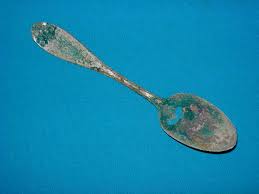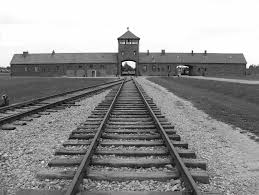It’s barely visible. Taped to the inside of the front bay window of a neat, modest house on a nondescript street in Toronto is a photocopy of a spoon.
The window, off the living room, is dominated by two large, healthy banana plants that have thrived there for many years. But if you look closely at the window of the house near Eglington Avenue, where my dear in-laws live, you’ll see the reproduction of the spoon, and might wonder why it’s there.
The answer to that question has to do with my father-in-law, Reb Yisroel Yitzchok Cohen, may he be well, an alumnus of a number of World War II concentration camps. And with Chanukah, too.
The spoon that was photocopied was one of the items he smuggled out of Auschwitz, when the Nazis moved him into “Camp Number Eight” – a quarantine camp, for those suspected of carrying typhus.
There were no labor details in that new camp, but the inmates were ordered to help in its construction, which was still underway. Having had some experience in the Lodz ghetto as a mechanic, my father-in-law helped the electrical technician install the camp’s lighting.
With his new access to tools, he brought his spoon to work and filed down its handle, making it into a sharp knife, which he used both to eat his soup ration and to cut the chunk of bread he and others were allotted and had to cut evenly to apportion it fairly. My father-in-law became the go-to person to wield his spoon-knife to help avoid disputes and maintain relative peace among the prisoners.
When winter came, he was transferred to “Camp Number Four” in Kaufering, a camp more similar to Auschwitz. Despite the terrible hardships the prisoners suffered daily, however, my father-in-law, a Gerer chassid, and other G-d-fearing Jews in the camp tried whenever possible to do what mitzvos they could, despite all the dangers that involved.
My father-in-law always kept mental track of the calendar, and he knew when Chanukah had arrived. During a few minutes’ rest break, he and a group of inmates began to reminisce about how, back home before the war, their fathers would light their menorahs with such fervor and joy. They remembered how they could never get their fill of watching the flames sparkling like stars, and basked in their warm, special glow.
And they spoke of the war of the Chashmonaim against their Seleucid Greek tormentors, who were intent on erasing Judaism from Jewish hearts. And how Hashem helped them resist and rout their enemy, enabling Jews to freely observe the Torah and mitzvos once again.
If only, they mused, if only they could light Chanukah candles.
One prisoner said he had a small bit of margarine he had saved from his daily ration. That could serve as our oil. And wicks? They began to unravel threads from our uniforms…
But a menorah. They needed a menorah.
My father-in-law took out his spoon. Within moments, the small group was lighting their Chanukah lichteleh, reciting the brachos of “Lehadlik ner”, She’asa nissim” and “Shehecheyanu.” The prisoners all stood there transfixed, immersed in their thoughts… of Chanukahs gone by.
The small flame kindled in them, too, a glimmer of hope. As they recited She’asa nissim, the bracha about the miracles Hashem had performed for our forefathers “in those days”, but also “at this time,” they understood that the only thing that could save them would be a miracle. A “nes gadol,” in fact.
Non-religious Jews, too, stood nearby and watched the luminous moment in the darkness of their concentration camp lives. Who knows what difference it may have made in their own lives.
My father-in-law today, along with his eishes chayil, are filled with gratitude for his having been graced with a personal miracle and surviving those days – a harrowing story in itself, which he chronicled in his ArtScroll/Mesorah book “Destined to Survive.”
And they thank Hashem for the children, grandchildren and great-grandchildren He has granted them, kein yirbu, committed to lives of Torah and mitzvos.
A more elaborate menorah than a spoon is placed at their window each Chanukah. But the spoon, or at least a photographic reproduction of it, always shares the window space, a reminder of a Chanukah many years ago in a very different place.
And, somehow, the large, thriving plants that frame the window seem appropriate too.
© 2016 Hamodia


